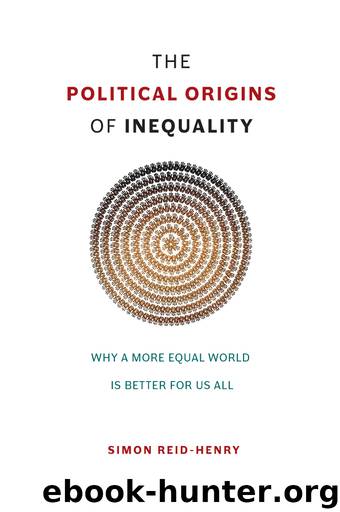The Political Origins of Inequality: Why a More Equal World Is Better for Us All by Simon Reid-Henry

Author:Simon Reid-Henry [Reid-Henry, Simon]
Language: eng
Format: epub
ISBN: 9780226236827
Publisher: University of Chicago Press
Published: 2015-11-17T16:00:00+00:00
Amidst all this double-speak it is no surprise that Western leaders struggle to cling to the moral high ground. Yet they are reluctant to abandon the position altogether, since it serves them far too well in times of crisis—times we are hardly short of these days. NATO acted with increasing entrepreneurial verve under its former secretary-general Anders Fogh Rasmussen to loosen the definition of violence (the better to allow greater room for manoeuvre when deciding whether and how to intervene in countries like Libya). These are moves met in the opposite direction by humanitarian organisations seeking to expand their definition of violence, if not their market share of the world’s suffering with it, and the effect has been to undermine the clarity of international law at just the historical moment when it has been needed most of all.
The associated blurring of the boundary between humanitarian and military interventions has, inevitably enough, carried Western nations into the fraught waters of the responsibility-to-protect doctrine. Enshrined as permissible international practice by NATO in Kosovo and under UN Security Council authorisation in East Timor in the late 1990s, interventions by multilateral coalitions of the willing are now “just”—in the words of Tony Blair, and he should know—to the extent that they are based not on military or political objectives in the first instance but on “values”.
Little wonder, then, that by the mid-2000s development agencies and humanitarian organisations were crying foul that the military was simply using them as “force multipliers”. They were right, of course. But to some extent they had only themselves to blame: for they had themselves plunged with eager hands into peace-building and protection for people who apparently could not be trusted to govern themselves. Imperialism now rides the coattails of the humanitarians; it once was the other way around—yet for those on the receiving end, it is far from clear that the change in roles makes all that much difference at all.
What is all too often overlooked today, amidst all the hand-wringing over our duty to intervene in crises elsewhere—to do something—is any consideration of the fact that we might bear some of the responsibility for what has brought events to such a sorry state in the first place. In the way we then do go about “protecting” the world’s poor—with the current mantra of “protection of civilians”, for example—we frequently open things up for more, not less, violence. There is more than a little irony in this. For as my colleague Ole Jacob Sending has observed, if it is true that in the current vogue for “ethical consumerism” the obligation to care and the desire to consume are collapsed into each other (help the poor by buying a cup of coffee or by purchasing a Louis Vuitton bag), the same is no less true in the political domain, as internationally, our promises of “protection” are collapsed into a simultaneous effort to order the world’s societies, and its failed states especially, in a manner that is to our liking.
It is
Download
This site does not store any files on its server. We only index and link to content provided by other sites. Please contact the content providers to delete copyright contents if any and email us, we'll remove relevant links or contents immediately.
International Integration of the Brazilian Economy by Elias C. Grivoyannis(110351)
The Radium Girls by Kate Moore(12018)
Turbulence by E. J. Noyes(8040)
Nudge - Improving Decisions about Health, Wealth, and Happiness by Thaler Sunstein(7693)
The Black Swan by Nassim Nicholas Taleb(7110)
Rich Dad Poor Dad by Robert T. Kiyosaki(6612)
Pioneering Portfolio Management by David F. Swensen(6289)
Man-made Catastrophes and Risk Information Concealment by Dmitry Chernov & Didier Sornette(6007)
Zero to One by Peter Thiel(5787)
Secrecy World by Jake Bernstein(4741)
Millionaire: The Philanderer, Gambler, and Duelist Who Invented Modern Finance by Janet Gleeson(4469)
The Age of Surveillance Capitalism by Shoshana Zuboff(4279)
Skin in the Game by Nassim Nicholas Taleb(4239)
The Money Culture by Michael Lewis(4198)
Bullshit Jobs by David Graeber(4179)
Skin in the Game: Hidden Asymmetries in Daily Life by Nassim Nicholas Taleb(3992)
The Dhandho Investor by Mohnish Pabrai(3759)
The Wisdom of Finance by Mihir Desai(3735)
Blockchain Basics by Daniel Drescher(3574)
